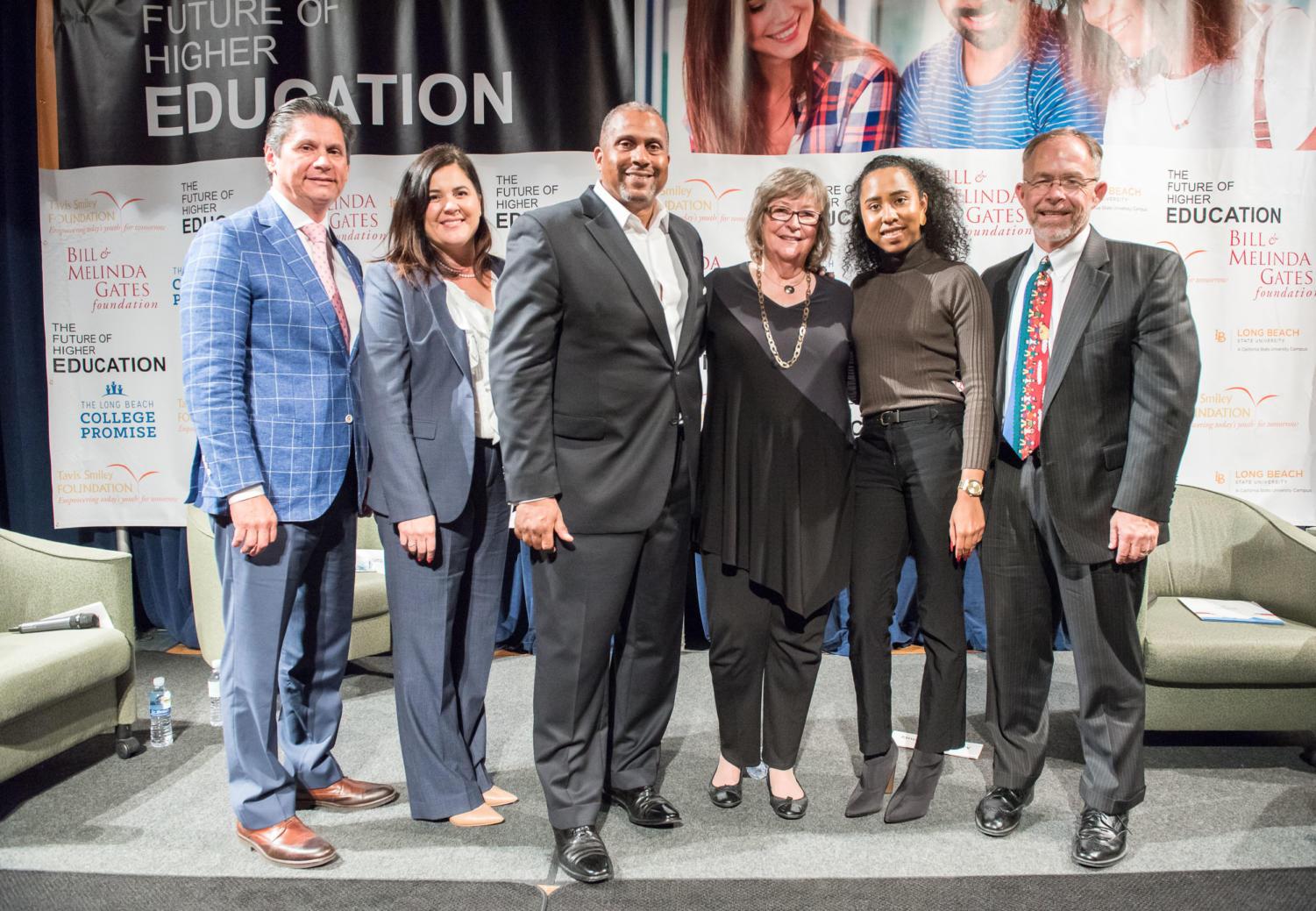Although there is no quick solution to dissolving barriers within higher education, Tavis Smiley and five panelists attempted to examine the root of problems like access, retention and graduation rates during a panel last week.
For the last 25 years, broadcasts from late-night television and National Public Radio host Tavis Smiley have piqued the ears of audiences throughout the United States. Stepping out from production studios and into the Beach Auditorium, the acclaimed host moderated the “Future of Higher Education” forum last Thursday at Cal State Long Beach.
Smiley has reported on a wide spectrum of social and political topics over the years. But his focus on education, largely centered on the many apparent failings of our current K-12 and higher education systems, stem from his own personal experience.
Born the eldest of 10 children to an impoverished family in rural Indiana, Smiley was the first person in his family to obtain a college degree. However, it wasn’t without tribulation, as his family obstructed his ability to apply for financial aid.
“I know what it’s like to really want to have access and opportunity [to higher education] and to feel like that’s beyond your grasp,” he said. ”Because of your circumstances and situations through no fault of your own.”
With intent to spark a dialogue about the rooted issues surrounding higher education, Smiley questioned a five-person panel comprised of several of Long Beach’s most prominent figures in education.
Smiley said he believes that access to an equal and high quality education, including that of a college degree, should be a constitutional right, but that current policy hinders this potential.
“We always have this conversation about equality in America but we never get to a question of equity,” Smiley said.
The notion of equity in education asserts that students who are farthest behind, most commonly minority students and those from low-income families, need more resources than students who are more affluent.
President Jane Close Conoley, who was a speaker on the panel, said she agrees that a strong educational foundation starting as early as preschool is imperative. She noted that although more needs to be done, Long Beach has taken some initiative.
There is the Math Collaborative, a program created to increase the mathematics achievement and college-going rates of African American males in North Long Beach. There is also a Long Beach Unified School District program, which ensures that preschool will be available for every child from a low-income family.
“We have to not start [the children] behind, because the data shows us [that] they don’t catch up,” Conoley said.
Eloy Ortiz Oakley, the chancellor of California’s community colleges, contends that there has been an accumulation of policy — be it intentional or not — that has been inhibiting students from accessing a college degree. Oakley said he’d like to see these barriers dismantled and revamped.
“We have gatekeeper after gatekeeper in our institutional organizations,” Oakley said. “Everything from standardized placement exams to the SAT and ACT, the signals that higher education sends to K-12, what it means to be college ready [and] what hoops do you have to jump through to get to us.”
Oakley said there is a cultural perception in the U.S. that claims college isn’t for everyone. In Oakley’s observation, this perception is an insidious opinion expressed usually by those with a college education. “Those of us who have obtained higher education want to suggest that because we made it, the process must be working,” Oakley said. “Well that’s just not the reality.”
Equally concerning are the challenges students face after admission. The university may have one of the lowest tuition costs amongst state colleges, but for many it’s costly nonetheless. Conoley lamented that despite rising graduation rates, minority groups still fall short of the mark.
The lack of representation for minorities on campus is an unequivocal barrier that alumnus Kyari Cail notices, despite the school’s noteworthy diversity. But Cail says trumping this is an issue of safety during a diverging social climate in and out of campus.
“The lack of strong acknowledgement of our political climate…is making a huge impact negatively, especially on our historically marginalized students,” Cail said.
The logistics of enabling equality and equity in education is a controversial and divided subject. But as Smiley travels across the nation on this “listening tour,” these hot-button issues at least have a platform from which to gain greater traction.




